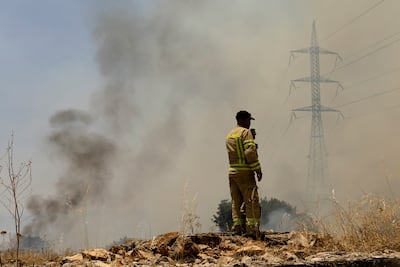Live updates: Follow the latest on Israel-Gaza
As fires caused by Hezbollah rockets raged across northern Israel, Israel's top military official said his forces were ready for a military offensive and a decision would be taken soon.
"We are prepared, following extensive training, for an offensive in the north," said Herzi Halevi, Chief of General Staff of the Israeli military.
"We are nearing a decision point," he added, on a day that he toured northern military bases.
Footage and images online showed vast areas of foliage in northern Israel ablaze, some near houses, with smoke blackening the sky.
Israel said six of its soldiers were injured as a result of smoke inhalation and taken to hospital.
With conflict intensifying between Israel and Hezbollah, a far-right minister urged his country's forces to occupy southern Lebanon and cause severe damage to the capital Beirut.
Blazes caused by Israeli attacks – sometimes using white phosphorus – are also a regular occurrence in southern Lebanon, destroying crops and farms.
Israeli incendiary shells sparked a forest fire that was approaching houses in the southern village of Alma Al Shaab on Tuesday, Lebanon's National News Agency reported.
Israeli war cabinet minister Benny Gantz said the committee would meet at 6.30pm local time to discuss the situation in north, adding that it will end in “decision-making”.
Hezbollah has said it does not seek to expand the conflict but is prepared to fight if Israel imposes a war.
The developments come as the conflict between Israel and Hezbollah reaches another stage of escalation, with the former hitting ever deeper into Lebanon and the latter utilising more advanced drones and missiles.
On Sunday, two Lebanese shepherds were killed in Israeli attacks.
On Monday, Israel's far-right Finance Minister Bezalel Smotrich warned the situation in northern Israel was “deteriorating”, as he called for a “ground invasion”.
He backed “the occupation of the territory and the removal of Hezbollah terrorists and hundreds of thousands of Lebanese – among whom Hezbollah is hiding, beyond the Litani River – combined with a deadly attack on all Lebanese infrastructures, the destruction of Hezbollah's centres of gravity and severe damage to the capital of terrorism in Beirut”.

About 60,000 people in northern Israel and 100,000 in southern Lebanon have been displaced by the conflict, which began on October 8 in parallel to Israel's war on Gaza.
The fires in northern Israel, worsened by the summer heat, continued to blaze overnight and forced the partial evacuation of the border town of Kiryat Shmona.
Lior Shelef, a reservist who guards the largely evacuated northern kibbutz of Snir, swapped military duties for fire fighting during the past few days.
“It’s a little bit problematic to fight fires knowing new rockets could be launched half an hour later. We have to bring fire fighting equipment with us while wearing bullet proof vests,” he told The National.
“We were very luck this year to be trained by an Australian team. In the last few days we were able to control fires that should have been massive in about 45 minutes to an hour.”
Out of control
Mr Shelef says the fires come at a particularly difficult time for his teams. “Hezbollah knows exactly what it’s doing. They launch weapons towards areas where there is cattle and hay. There was lots of rain this year so we have a lot of hay,” he said.
“We have been highly prepared since the Second Lebanon War for Hezbollah using fires as a weapon,” he added, referring to the 2006 conflict between the two sides, the last time they fought a fully-fledged war.
“Things are getting out of control up north – all hell has broken loose. We don’t know where it’s going at the moment, but we’re ready,” he said.
Israel has expanded the scope of its attacks, initially contained to the border areas but now much deeper into Lebanon on a regular basis.
Hezbollah, meanwhile, has upped the ante. On Monday night it launched a swarm of drones towards the headquarters of the Israeli military's Galilee formation. While the Iran-backed group has attack Israel with drones before, it has not done so with such a large attack, using what it called a full squadron.
Hezbollah on Tuesday launched a “swarm of drones” on the Israeli-Occupied Golan Heights in response to the killing of two its members on Monday.
The attack was aimed at the headquarters of Brigade 810, the Lebanese armed group and political party said. There were no initial reports of casualties.
The Lebanese armed group and political party has also become increasingly more daring in its attacks, recently releasing footage of a Hezbollah fighter firing an RPG at Israel a few metres from the border.
Hezbollah has said it will not cease its attacks until Israel halts its bombardment on the devastated Gaza Strip, where more than 36,500 Palestinians have been killed since October, mostly civilians.
Israel wants to ensure its residents in the north of the country will remain secure in the future and free from any security fears from Hezbollah.
It has repeatedly threatened to launch a large operation in Lebanon if Hezbollah does not withdraw from the southern border, to allow tens of thousands of people displaced from the northern border region to safely return.
